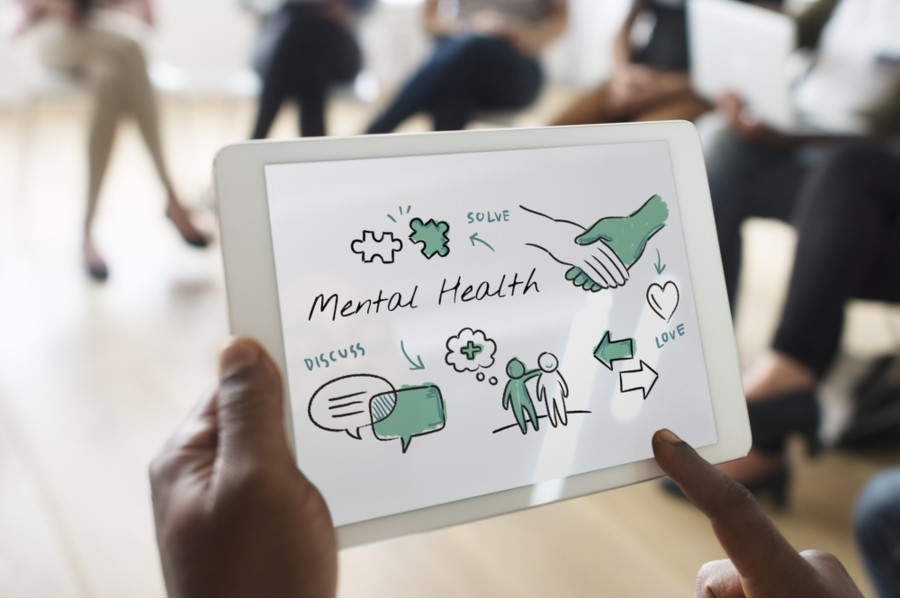How to use technology to tackle mental health stigma

“Talking to an anonymised source rather than visiting and sitting with a person could be a way to get care and treatment into places where there is stigma,” says Alan Payne, Chief Information Officer, Aetna International. “Although a mobile phone cannot replace the role of a professional, it may go some way in helping to avoid unnecessary contact with a clinician. And hopefully, with time, that stigma will dissipate.”
According to the World Health Organization (WHO) one in four of us will experience a mental health issue at some point in our lives. The spectrum of mental health conditions covers stress, anxiety, depression, bipolar disorder, schizophrenia and more. Symptoms can vary from person to person. Individuals with a mild form of neuroses are generally able to function on a day-to-day basis, while those with more severe disorders can experience significant disruptions in their daily life and even lose touch with a sense of reality.
Physical and mental health conditions are viewed and treated very differently across the globe. For example, while the West is keen to lead the charge with de-stigmatisation of mental health, stigma remains prevalent in Hong Kong and a range of other cultures and regions.
“Some countries endorse and embrace” mental health diagnoses and treatment, says Payne, while others “consider you a pariah if you even mention it”.
Technology has enabled some people experiencing mental health issues to self-manage their condition through:
- apps such as mood trackers
- depression tests
- mindfulness and calming sessions
- online platforms.
Depending on the severity of the person’s condition, these tools enable some individuals to take control and share information with mental health clinicians.
“Trust is incredibly important, particularly with mental health,” notes Payne. “You trust your doctor to prescribe a digital health care journey as well as a physical pathway. And people need to trust the technology.”
Although there have been many campaigns and movements to reduce the stigma surrounding mental health, the pathways to treating clinical depression, for instance, remain too complex to be viewed the same as treating physical injuries. The state of global mental health still has a long way to go, according to WHO’s Mental Health: New Understanding, New Hope (2001) report. It finds that more than 40 per cent of countries have no mental health policy and more than 30 per cent have no mental health programme.
Academia’s larger role
The academic world is taking more of a role than governments in incorporating technology into mental health treatment, says Payne, who also holds an honorary professorship at University College London (UCL). Difficulties remain in effectively measuring mental health outcomes in the face of inconsistent and non-standardised measurement methodologies.
“Academia is building outcome-based approaches to explore the use of digital technology to support mental health programs,” he notes. “UCL is doing great work on addiction with the Centre for Behaviour Change, particularly around smoking cessation techniques that are not drug-based.”
He adds that tests of a ‘quit smoking’ app have produced impressive results, with subjects having a 25 per cent chance of being smoke-free after a year of using it.
The instruments of revolution
Communication giant Ericsson predicts in its Mobility Report (2004) that 90 per cent of the world’s citizens will have access to a mobile phone by 2020. As a result, the potential role of tech in tackling mental health issues cannot be ignored. Personalised delivery methods and service-based health are models have been driving consumers to seek help through ‘Dr Google’ and apps without proper statistical underpinning of what actually works.
It’s not all about the gadgets
New technology seems to occupy more and more of the news agenda, with innovations in genetic medicine and robotic operations garnering media attention. But when it comes to mental health, focus should be more on data analysis than on the gadgets themselves.
“Technology by itself is not as important as the concept of data and customer experience,” says Payne. “The personalised nature of data is driving ever-increasing opportunities to identify where behaviours – particularly modifiable ones – can be diagnosed and intervention strategies created.”
There are clear winners in this space, he adds, and mental health is one of them. Tech has shown notable successes with mindfulness and sentiment attachment simply by tracking how patients respond in communications.
For example, email communication style can indicate a person’s level of stress in the workplace. Through an opt-in service that can privately assess the way someone is responding to emails, the individual can get a stress level rating based on the language used, response time and other metrics. Using that rating, guidance can be provided to suggest such interventions and preventative measures as taking a break or going outside.
Doctors can also use technology to prescribe digital and physical care pathways, recommending and monitoring lifestyle changes as well as prescribing medication.
“What if for type 2 diabetes, you could prescribe lifestyle changes that can be monitored and adhered to and tracked?” asks Payne. “What if we could build in the ability for biometric feedback as well as sentiment for how you’re feeling as you’re going through the treatment?”
Who benefits
For many people in need of mental health support, technology can offer relevant, customised, private guidance. When technology helps sustain employee mental health, businesses benefit through potential reduced absenteeism, increased productivity and employee retention. And it lets health services leverage personalisation, cognitive computing and biofeedback to reach more people in a cost-effective manner.
Limitations of technology
But are there drawbacks of technology being used for mental health prevention and treatment? Stigma around mental health is a recognised hurdle, but what about the technology itself?
“Technology isn’t a panacea for every person,” says Payne. “Some people will respond to social and physical intervention, while others will respond to a bot.”
He adds that barriers may include costs, logistical issues surrounding connectivity and access, data privacy concerns, and compliance with regional regulations.
Expat mental health challenges
For those moving or travelling abroad, mental health issues can be exacerbated. Living in an unfamiliar environment and lacking support from their friends and family network back home makes expats more likely to face mental health concerns.
Language and cultural differences can present additional barriers. For example, in Zambia, mental health problems are commonly seen as a form of punishment from God. Technology could be very useful there for support networks or using apps to help those with existing or new conditions cope.
The right apps
The study, Computer-based psychological treatments for depression: A systematic review and meta-analysis (2012), indicates that apps can be helpful in providing an essential support network to those experiencing mental health issues. The anonymity offered can enable individuals to share, read or view content on where to find help or ask questions that they may feel ashamed or embarrassed to ask. Apps can be useful for self-management of mild conditions. However, in the study, App-based psychological interventions: friend or foe? (2015) it was found that it depends on the app chosen and whether it’s peer-reviewed.
Ultimately, technology is a fundamental part of our lives that has a place in all our experiences, including mental health conditions. When properly harnessed and directed, it can play a great role in helping manage or treat certain conditions — on its own or in conjunction with professional guidance.
This article was provided by Aetna.
Supplied by REBA Associate Member, Aetna
Aetna is re-shaping and improving health care across the globe by developing solutions.







